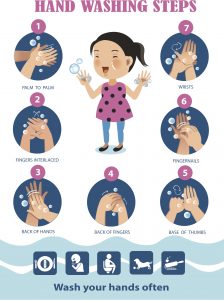 It’s that time of year when the flu, or seasonal flu, is rearing its ugly head to infect people of all ages with the influenza virus. The flu virus is highly contagious and spreads easily from person to person usually from a cough, a sneeze or from touching contaminated surfaces to cause respiratory illness. The flu virus enters your body through the eyes, nose or mouth, referred to as the “T Zone”.
It’s that time of year when the flu, or seasonal flu, is rearing its ugly head to infect people of all ages with the influenza virus. The flu virus is highly contagious and spreads easily from person to person usually from a cough, a sneeze or from touching contaminated surfaces to cause respiratory illness. The flu virus enters your body through the eyes, nose or mouth, referred to as the “T Zone”.
It is estimated that between 5% to 20% of people in the U.S. get sick with the flu each year, with anywhere between 3,000 to 49,000 Americans becoming so ill the flu results in death. Most people feel better after about a week or two, but for those at a high risk of developing complications the flu can be deadly. You are at a higher risk of developing complications from the flu that may lead to hospitalization or death if you have asthma, lung diseases like COPD or other chronic conditions.
Symptoms of the Flu
Flu symptoms may come on suddenly, if treatment is sought early enough there are antiviral medications that may help to reduce symptoms and speed up recovery. People in a high risk category of developing complications should immediately seek medical treatment which may include antiviral medications such as TamiFlu®.
Antivirals must begin within a day or two of becoming sick or they will be ineffective. This is why it is so important to see your doctor with any flu-like symptoms. Flu symptoms may include:
- Sore throat
- Runny nose and nasal congestion
- Cough (usually a dry cough)
- Sudden high fever
- Headache
- Chills
- Fatigue
- Stomach symptoms (nausea, vomiting, diarrhea)
If you experience these flu-like symptoms contact your doctor right away to see if antiviral medication may help to lessen the severity of your symptoms.
Get Vaccinated to Prevent Serious Flu Complications
There are 3 different flu viruses, A, B and C with the most serious complications caused by the A and B virus. The Influenza A virus contains various strains or subtypes of the virus such as H1N1 and H3N2, which are included in the flu vaccine. The flu virus is constantly changing with new strains identified, which is why it is so important to get vaccinated as scientist work diligently to identify and vaccinate against newly recognized strains.
The flu vaccine is recommended for people of all ages, especially for with those in a high risk category which includes infants over the age of 6 months, pregnant woman and people over the age of 65. Infants under 6 months of age are too young to get the vaccine, which makes it very important for parents and caregivers to get vaccinated as the flu virus in a young infant may cause serious, life threatening complications. High potency vaccines are available for people over 65 and children between the ages of 6 months to 8 years old may require two doses of the vaccine to be fully protected.
Types of Flu Vaccines
The flu vaccine is available in different forms, a flu shot and a spray mist. The flu shot works by helping the body develop antibodies to protect against infection from the various strains included in the vaccine. It typically takes about two weeks before the body has developed an immunity to the flu, with antibodies at the highest level one to two months after receiving the vaccination before they begin to decline. The flu shot is safe for people with asthma, is covered by most insurance and Medicare and is made from inactivated (dead) parts of the virus.
The spray vaccine is a nasal spray mist which is made from live virus strains which are weakened. The FluMist vaccine is recommended only for people between the ages of 2 to 49 who are healthy, are not pregnant and not in a high risk group such as having asthma, COPD or lung disorders. The FluMist nasal spray is an approved alternative to the flu shot.
Getting vaccinated from the flu is the best way to protect yourself and loved ones from contracting and spreading the illness. Learn more about the flu, vaccines and treatments at the American Lung Association.
Practice Healthy Hand Washing Habits
Practicing healthy hand washing habits is very important to prevent the spread of the flu, with the 4 main principles of hand awareness endorsed by the American Medical Association. The 4 principles of healthy hand washing include:
- Always wash hands before eating or when they are dirty
- Never cough into your hands
- Never sneeze into your hands
- Never put fingers in your eyes, nose or mouth
Henry the Hand Foundation is a non-profit organization recognized for promoting awareness to the principles of hand washing with hygiene behavior programs for children and adults. Visit Henry the Hand Foundation to learn more about practicing and endorsing healthy hand washing, and to learn more about the Infection Prevention Tool Kits available for homes, schools and hospitals.
Getting sick is no fun and with the Holidays here we want to feel healthy to spend time with family, children and our elderly loved ones. Be sure that you protect yourself and your loved ones from contracting the flu with a flu vaccine and healthy hand washing habits.
Greater Waterbury Imaging Center cares about your health and wellness, we encourage you to get the flu vaccine and practice healthy habits. Don’t forget to contact your doctor immediately upon experiencing flu symptoms for antiviral medication that may help. Contact us for all your medical MR imaging needs.


